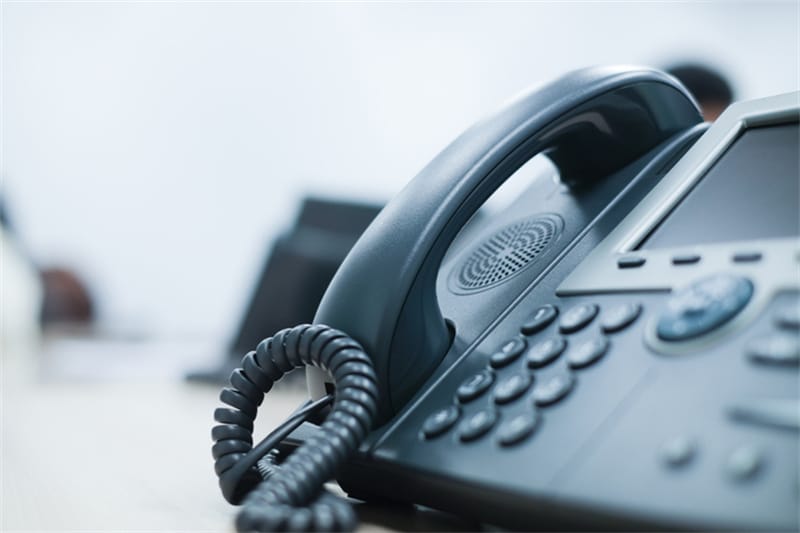
A receptionist is typically an organization's first point of contact, playing a crucial role in shaping first impressions. This role is multidimensional and often requires multiple tasks, such as answering phone calls, scheduling appointments, and providing customer service.
The receptionist serves as a linchpin, ensuring smooth operation and efficient communication within the organization. Given the demanding nature of this role, it is essential to explore ways to make the job easier and more efficient for receptionists.
1. Invest in a Good Phone System to Handle Calls Efficiently

Investing in a good phone system can significantly improve the efficiency of a receptionist's role. Today, Advanced phone systems have features such as call forwarding, automated responses, and multi-line management. These features can help handle large volumes of calls without compromising on service quality or responsiveness. For instance, call forwarding can direct calls to the appropriate department, reducing the time receptionists spend routing calls manually.
More importantly, a good phone system supports better communication practices. The receptionist can focus more on answering the phone professionally and less on managing the system. For example, automated responses can help share basic information or handle common inquiries, freeing the receptionist to handle more complex tasks. A good phone system thus not only makes the receptionist's job easier and enhances the overall communication efficiency within the organization.
2. Utilize an Online Booking System for Scheduling Appointments
Online booking systems can help receptionists save time by automating the appointment scheduling process. This technology allows clients to book, reschedule, or cancel appointments at their convenience by providing a 24/7 accessible platform. It eliminates the need for back-and-forth phone calls or emails, thus saving time and reducing chances of human error. An additional advantage is the immediate confirmation and automated reminders it provides, reducing instances of no-shows.
Moreover, online booking systems have features such as calendar syncing, time-zone adjustment, and personalized scheduling pages, which can further enhance efficiency. Calendar syncing ensures seamless integration with the receptionist's schedule, avoiding double-booking or overbooking.
The time-zone adjustment feature is particularly beneficial for organizations operating across different regions. Personalized scheduling pages can be tailored to reflect the organization's branding, thus improving client experience.
3. Implement a Digital Filing System

In traditional paper-based systems, receptionists spend significant time manually filing, retrieving, and organizing documents. This process is time-consuming and prone to errors, such as misplacement or loss of essential documents. A digital filing system simplifies this process by enabling quick and easy document search, storage, and retrieval. It allows receptionists to manage documents with a few clicks, saving time and reducing the risk of errors.
Digital files can be securely stored, minimizing the risk of damage or loss. They can be encrypted and password-protected, ensuring access only for authorized personnel. A digital filing system allows remote document access, which is ideal for today's flexible work environments. A digital filing system streamlines the receptionist's role and enhances organizational workflow.
4. Invest in Quality Customer Service Tools
Customer service tools such as a customer relationship management (CRM) system can help receptionists provide better customer service. A good CRM system allows the receptionist to track and store client information, making it easier to access and update relevant details when needed quickly. By tracking data related to previous customer interactions, the receptionist can provide more personalized service, thus improving customer experience.
CRMs also support automated processes such as email or SMS notifications to inform customers of their appointment status. Furthermore, specific CRM systems come with integrated technologies such as live chat and virtual assistants that can further enhance customer service efforts. Investing in quality customer service tools thus helps the receptionist provide better customer service while reducing the time and effort spent dealing with customers.
5. Utilize Automation Tools to Streamline Tasks
It is common for receptionists to be bogged down with mundane and repetitive tasks such as data entry or document scanning. Automation tools can streamline these processes, saving time and reducing effort. Here are a few automation tools that can help receptionists:
- Robotic Process Automation (RPA): RPA technology helps automate manual processes such as data entry, document scanning, or form filling. This eliminates the need for manual intervention, saving time and effort.
- AI Chatbots: AI chatbots are conversational assistants handling routine customer inquiries and providing helpful information. This reduces the receptionist's workload and allows them to focus on more complex tasks.
- Email Automation: Email automation can help create personalized messages or automated appointment reminders, thus freeing up time for the receptionist.
Automation tools make the receptionist's job easier and improve customer service efficiency by reducing waiting times and providing faster response times. This can result in higher customer satisfaction and improved organizational effectiveness.
6. Provide Customer Service
In the hospitality industry, providing exceptional customer service is the key to success. Receptionists are the face of the organization and, thus, must be well-trained in customer service practices. This includes having a good understanding of the organization's products or services, as well as being able to resolve customer inquiries quickly and efficiently. Receptionists should ensure courteous communication with clients at all times, both on the phone and in person.
Moreover, receptionists should also be well-versed in the organization's policies and procedures. This ensures that customers are served according to the set guidelines, thus preventing customer dissatisfaction due to a lack of information or incorrect advice. Setting up a comprehensive customer service training program helps the receptionist become better equipped to handle customer inquiries with ease.
7. Make Use Of Technology
Technology can be beneficial in making a receptionist's job easier. For instance, one can use artificial intelligence to answer customer queries or automate certain repetitive tasks. This reduces the receptionist's workload and helps keep customers satisfied. By deploying voice-activated assistants, one can also provide a hands-free experience for customers in the reception area, thus enhancing the user experience.
Finally, one should ensure the organization's technology is up-to-date and well-maintained. This helps reduce technical issues and ensures the receptionist can handle their tasks efficiently. A good IT support system further ensures that any technical issues are quickly resolved, minimizing downtime and maximizing productivity. Putting in place such safeguards helps make the receptionist's job easier.
To make the receptionist's job easier, invest in quality customer service tools, embrace automation and technology, and streamline the process. Implementing these strategies ensures an efficient workflow and improved customer experience. With these measures, receptionists can provide excellent customer service without feeling overwhelmed. This helps organizations achieve better results and enhance overall performance.










